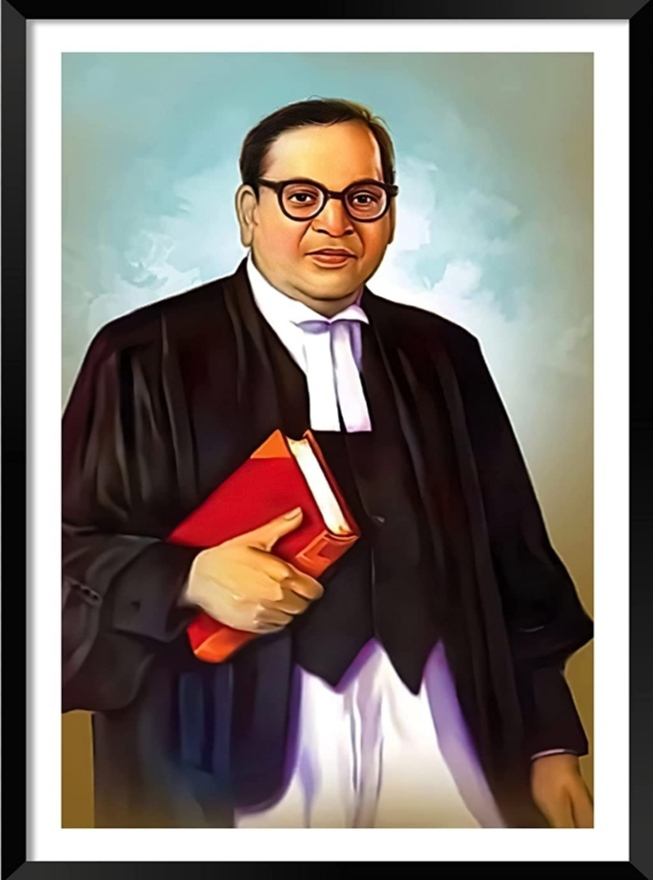"Remembering Dr. B.R. Ambedkar: The Visionary Leader Who Fought for Equality and Social Justice".
Bhimrao Ramji Ambedkar, also known as Dr. B.R. Ambedkar, was a renowned Indian jurist, social reformer, and politician who worked tirelessly for the rights of the oppressed and underprivileged sections of society. Born on April 14, 1891, in Mhow (now in the state of Madhya Pradesh), he was the son of Ramji Maloji Sakpal, a Subedar in the Indian Army, and Bhimabai Murbadkar Sakpal. Ambedkar is widely regarded as the architect of the Indian Constitution and is credited with laying the foundation for modern India's social and political landscape.
Childhood and Early Education :-
Ambedkar's childhood was marked by poverty and discrimination. His family belonged to the Mahar caste, a low caste that was considered "untouchable" in the Hindu caste system. As a result, he faced discrimination and persecution from an early age. Despite these challenges, he was a bright student and showed in exceptional academic promise. He completed his primary education in Satara and then moved to Bombay (now Mumbai) to attend high school.
In Bombay, Ambedkar continued to face discrimination and humiliation from his upper-caste classmates. Despite this, he excelled academically and eventually secured a scholarship to attend college. He obtained his Bachelor of Arts degree from Elphinstone College, Bombay, and went on to pursue a law degree from the University of Bombay.
Social Activism :-
Ambedkar was deeply committed to social justice and equality. He believed that the caste system was an oppressive social structure that needed to be eradicated, and he worked tirelessly to break down the barriers that prevented people from different castes and communities from coming together. He was a strong advocate for Dalit rights and worked to uplift those who were marginalized and oppressed.
Ambedkar's activism was not limited to social reform. He was also a strong believer in the power of education to transform lives and communities. He established several institutions that were dedicated to providing education to the underprivileged. These institutions included the People's Education Society, the Siddharth College of Arts and Science, and the Milind College of Science.
In addition to his work in the field of education, Ambedkar was also a prolific writer and speaker. He wrote extensively on a range of issues, including social justice, politics, and economics. His speeches and writings continue to inspire people today, both in India and around the world.
Constitutional Assembly and Contributions to the Indian Constitution.
Ambedkar was a key member of the Constituent Assembly, which was tasked with drafting a new constitution for independent India. He served as the Chairman of the Drafting Committee and played a significant role in shaping India's democratic and secular values. Many of the provisions in the Indian Constitution that protect the rights of marginalized communities are a result of Ambedkar's efforts.
One of Ambedkar's most significant contributions to the Indian Constitution was the inclusion of Article 17, which abolishes the practice of untouchability and prohibits its practice in any form. He also worked to ensure that the Constitution provided for affirmative action measures to address the historical injustice faced by Dalits and other oppressed communities.
Political Career :-
Ambedkar's political career spanned several decades. He was appointed as India's first Law Minister in 1947, and he played a key role in the drafting of several important laws, including the Hindu Code Bill. He was also a member of the Rajya Sabha, the Upper House of the Indian Parliament.
Despite his many achievements, Ambedkar faced significant opposition and criticism throughout his political career. He resigned from his position as Law Minister in 1951 and went on to form the Independent Labour Party. He also established the Republic Party of India in 1957.
Death and Legacy :-
Dr. B.R. Ambedkar passed away on December 6, 1956, in Delhi. Despite his untimely death, his legacy lives on. He remains one of the most important figures in Indian history, and his ideas and vision continue to inspire people around the world.
Ambedkar's contributions to Indian society have been recognized in a number of ways. Many institutions and buildings across India are named after him, including universities, hospitals, and airports. His birth anniversary, April 14, is celebrated as a public holiday in many states, and his statue can be found in numerous public spaces across the country.
Ambedkar's life and work continue to serve as a source of inspiration and hope for millions of people across India and beyond. His message of social justice, equality, and freedom remains as relevant today as it was during his lifetime.



Comments
Post a Comment